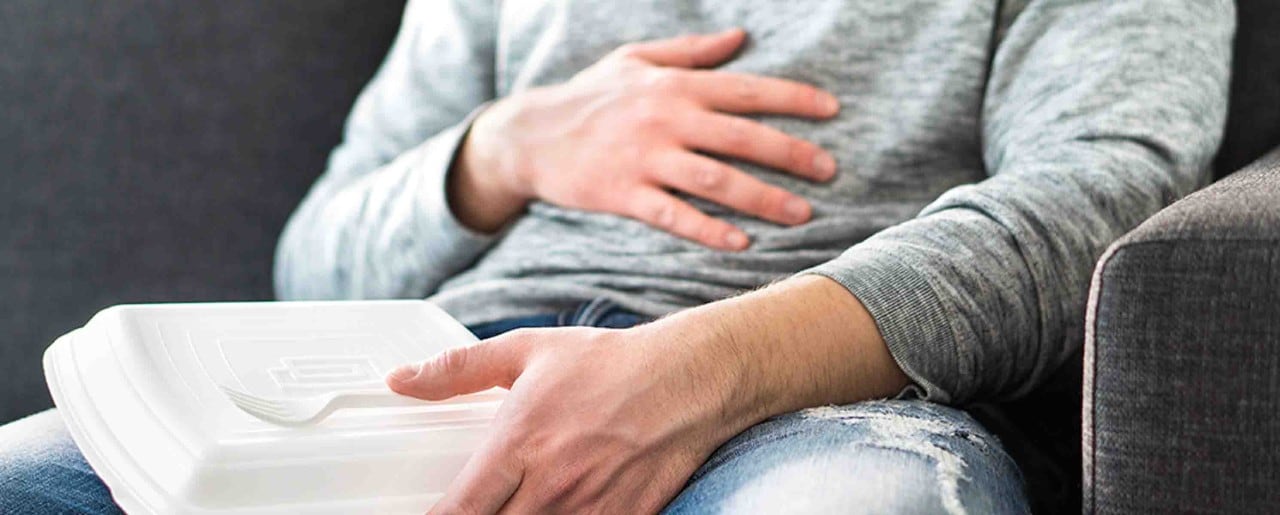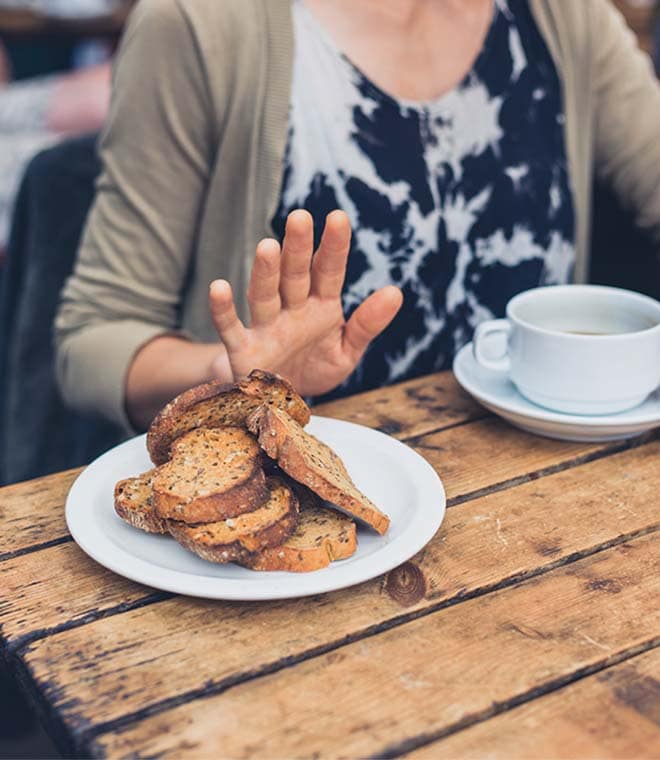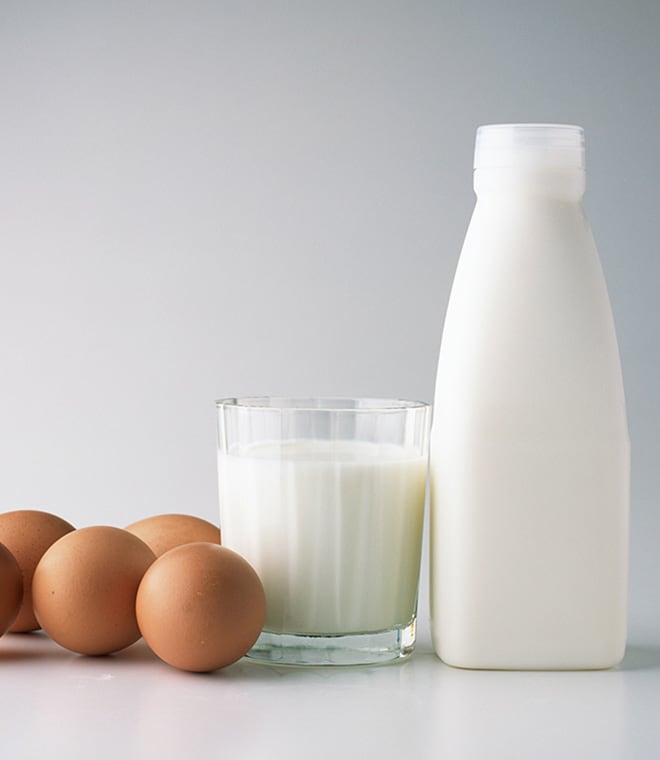Health
Bloating after eating: What you need to know
By Jenilee Matz, MPH May 20, 2024 • 6 min
Bloating is an uncomfortable fullness, pressure or swelling in your stomach. Some people describe it as a feeling like they have an inflated balloon or trapped gas in their abdomen. A bloated stomach most often occurs after eating a meal. Here you'll learn more about bloating, including what causes bloating and if there are certain foods that don't make you bloated.
What causes bloating?
Bloating is common, occurring in 20% to 30% of the general population and in up to 96% of people with irritable bowel syndrome. It tends to be caused by gas in your digestive tract. The gas can occur for many reasons, including swallowing too much air, consuming foods that cause gas, and having certain health issues. Medical conditions that can cause bloating include:
- Irritable bowel syndrome (IBS): If you have bloating and gas after eating, you may have IBS. This is a group of symptoms that affect how gas moves through your intestines. It causes bloating, pain, cramping and diarrhea.
- Constipation: Bacteria can ferment on stool that sits in your colon. This can lead to increased gas and bloating.
- Gastroparesis: In this motility issue, the muscles along the digestive tract do not work properly, which causes the stomach to empty too slowly. This can lead to bloating, nausea and bowel blockage.
- Small intestine bacterial overgrowth (SIBO): SIBO is marked by an increase or change in the bacteria in your small intestine, leading to bloating, diarrhea and weight loss. SIBO often occurs with other conditions, such as IBS.
- Gastrointestinal reflux disease (GERD): In GERD, the contents of your stomach flow backward up into the small intestine. This can cause burping and bloating.
- Carbohydrate intolerance: Some people lack certain enzymes needed for digesting carbohydrates. These undigested carbohydrates travel to the large intestine where they may cause diarrhea and gas from pulling water and fermentation.
- Celiac disease (an inability to tolerate gluten, the proteins found in wheat, barley and rye) can cause bloating
- Lactose intolerance (an inability to break down lactose, the naturally occurring sugar in dairy products) can lead to bloating.
- Inflammatory Bowel Disease (IBD), Crohn’s disease and ulcerative colitis are chronic inflammatory conditions of the gastrointestinal system. Some of the many symptoms may include bloating and gas.
What foods make you bloated?
Bloating and gas can be caused by consuming certain foods. Some studies have shown that reducing sodium intake can help with decreasing bloating symptoms. While foods that cause bloating differ among people, the following foods, drinks and products can cause excess gas, which can lead to bloating.
Type of food, beverage or product |
Examples |
Vegetables |
Asparagus, broccoli, Brussels sprouts, cabbage, cauliflower, mushrooms and onions |
Fruits |
Apples, peaches and pears |
Beans |
Black beans, navy beans and pinto beans |
Dairy products |
Milk, cheese, ice cream and yogurt |
Whole grains |
Whole wheat and bran |
Processed foods that contain lactose |
Bread, cereal and salad dressings |
Beverages |
Carbonated drinks with high-fructose corn syrup, such as soda, apple or pear juice, fruit punch and milk |
Sugar-free products that contain sugar alcohols as a sugar substitute, such as mannitol, sorbitol or xylitol |
Candy or gum |
Additives or supplements that contain certain types of fiber |
Inulin and oligosaccharide are types of fiber that may be added to processed foods to replace fat or found in some supplements. |
How to manage bloating
Bloating treatment depends on the underlying cause. For instance, if you have bloating due to SIBO, your healthcare provider may prescribe an antibiotic. Bloating due to celiac disease means avoiding products that contain gluten, and bloating from lactose intolerance means eliminating dairy products from your diet. For occasional bloating, treatment may include lifestyle and dietary changes or over-the-counter (OTC) medications.
Lifestyle changes
Everyone swallows air when they eat and drink, but swallowing too much air can lead to belching and bloating. Changing certain behaviors can help reduce the amount of air in your digestive system, including:
- Eat and drink more slowly
- Eat smaller, more frequent meals rather than large meals
- Don't chew gum or suck on hard candy
- Avoid carbonated or fizzy beverages
- Stop using straws for drinking
- Stay hydrated by drinking plenty of fluids to help digestion
- Don't smoke; if you smoke, get help to quit
- Make sure your dentures fit tightly enough, if you wear dentures
- Getting enough exercise and improving your posture may also help improve bloating in some people
Dietary changes
Avoiding or limiting foods that cause gas may help reduce bloating after eating. To figure out the exact foods that cause you to feel bloated, consider keeping a food and symptom journal. Log each food you eat and note your symptoms afterward. This can identify your personal triggers and help you find foods that don't make you bloated.
OTC medications, such as antacids, can also decrease bloating and gas in some cases. Although other commonly used remedies, such as simethicone, activated charcoal or probiotics haven't been proven to help, some people feel that these products work. Talk to your healthcare provider or pharmacist before trying any OTC medicines for bloating.
If you often have bloating after eating and changing your habits doesn't help, talk to your healthcare provider. They can help determine the cause of your bloating and recommend a treatment plan.
Clinically reviewed and updated by Julie McDaniel, MSN, RN, CRNI, May 2024.
Sources:
- https://www.uptodate.com/contents/overview-of-intestinal-gas-and-bloating
- https://www.niddk.nih.gov/health-information/digestive-diseases/gas-digestive-tract/symptoms-causes
- https://www.hopkinsmedicine.org/health/wellness-and-prevention/bloating-causes-and-prevention-tips
- https://www.iffgd.org/symptoms-causes/bloating-and-distension.html
- https://www.mayoclinic.org/diseases-conditions/gas-and-gas-pains/in-depth/gas-and-gas-pains/art-20044739
- https://publichealth.jhu.edu/2019/higher-salt-intake-can-cause-gastrointestinal-bloating
- https://newsnetwork.mayoclinic.org/discussion/mayo-clinic-q-and-a-food-to-reduce-bloating/
- https://familydoctor.org/condition/bloating/
- https://www.hopkinsmedicine.org/health/conditions-and-diseases/inflammatory-bowel-disease
- https://www.merckmanuals.com/professional/gastrointestinal-disorders/malabsorption-syndromes/small-intestinal-bacterial-overgrowth-sibo
- https://www.merckmanuals.com/professional/gastrointestinal-disorders/malabsorption-syndromes/carbohydrate-intolerance
- https://www.yalemedicine.org/conditions/gastroparesis




